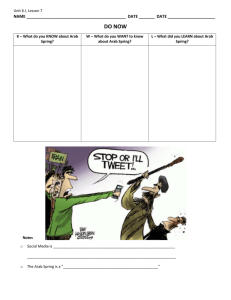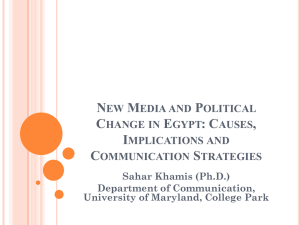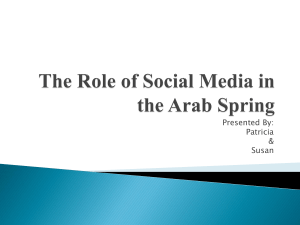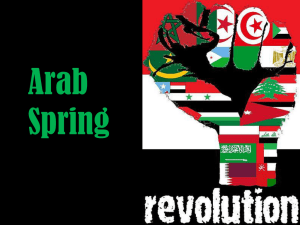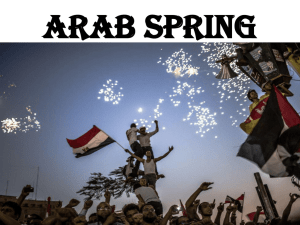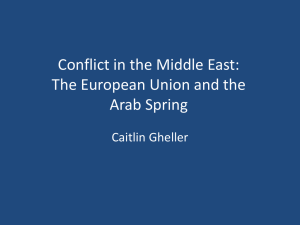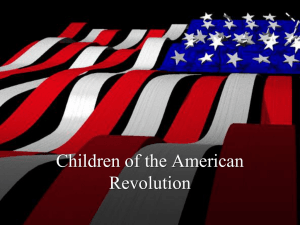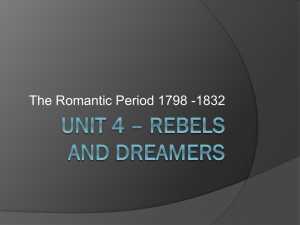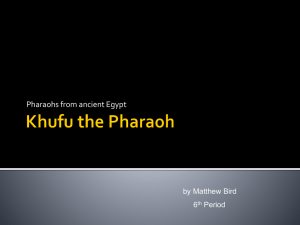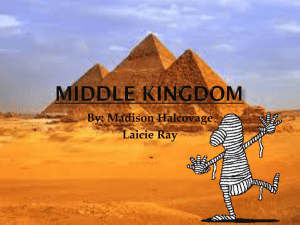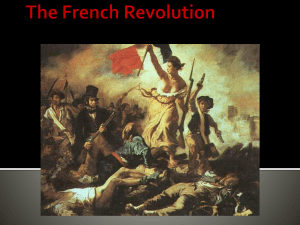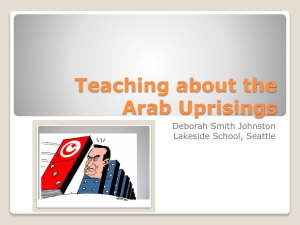Revolution 2.0
advertisement
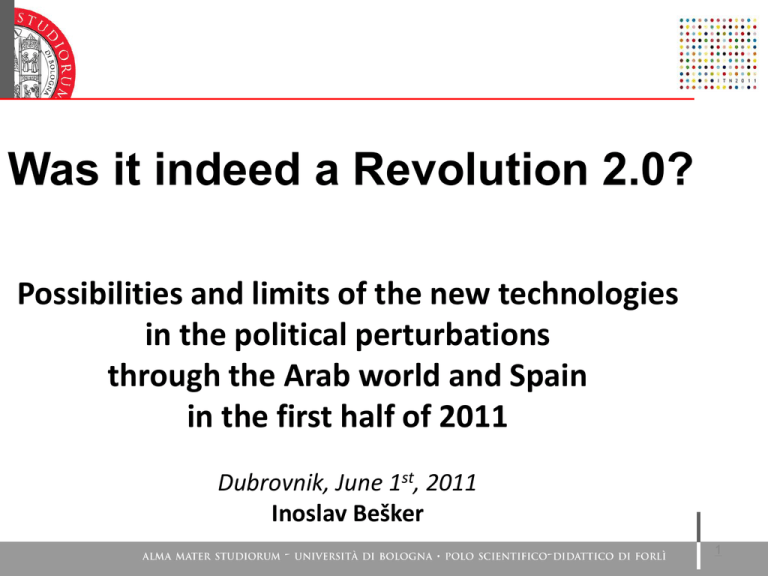
Was it indeed a Revolution 2.0? Possibilities and limits of the new technologies in the political perturbations through the Arab world and Spain in the first half of 2011 Dubrovnik, June 1st, 2011 Inoslav Bešker 1 Facebook baby A young Egyptian man has named his firstborn Facebook Jamal Ibrahim 2 Puerta del Sol 3 Ghonim’s book Revolution 2.0 • American publisher Houghton Mifflin Harcourt anounced Ghonim’s book Revolution 2.0 for January 25th, 2012 • Was it a revolution? • Was it a 2.0? Wael Ghonim 4 What’s going on in 2011? • Tunis: President Ben Ali ousted, and government overthrown. • Egypt: President Hosni Mubarak ousted, and government overthrown. • Libya: divided by civil war, experiencing a NATO intervention. • Syria, Yemen, and Bahrain: Civil uprisings against the governments, despite government changes. • Jordan, Kuwait, and Oman: implementing government changes in response to protests. • Algeria, Iraq, Western Sahara etc.: ongoing protests. 5 Rebellions and riots 2011 6 Causes of the riots • • • • • • • • demographic structural factors, unemployment and poverty, lack of perspective for youngsters human rights violations, government corruption, dictatorship, inflation, etc. 7 Youth presence 8 A match which set the Arab world on fire • The self-immolation of a street vendor Mohammed Bouazizi (26) in the town of Sidi Bouzid in protest of the confiscation of his wares and the humiliation that was inflicted on him by a municipal official - led to the downfall of the Tunisian President Zine al-Abedine Ben Ali. • #SidiBouzid • Self-immolations in Algeria, Jordan, Mauritania, Saudi Arabia, Egypt, Syria, Iraq Mohammed Bouazizi, suicide by immolation in Sidi Bouzid, Tunisia, on December 18, 2010 9 Jasmine revolution • My name is freedom. Born in Tunisia, raised in Egypt, studied in Yemen, fought in Libya and I'll grow up in the Arab world. @AliTweel, Twitter 10 Egypt #Jan25 • Young Egyptian Khaled Said was beaten to death by police in June 2010. • Facebook page „We are all Khaled Said” in Arabic was ran by Google executive Wael Ghonim, who runs #Jan25 too • Facebook page „We are all Khaled Said” in English (http://www.facebook.com/elshaheeed.co.uk) has 119,744 „likes” as for May 31. • Its main topics now are Syria and Egypt 11 Bahrain #Feb14 • As in Egypt, many of those with the latest mobile phones used live web streaming devices to broadcast images directly from the protests. • Sites such as Ustream, Livestream and Bambuser have enabled young protesters to take to the internet and filming live, while simultaneously taking part in the protests. 12 Lybia #Feb17 • On 17 February 2006 security forces killed at least a dozen protesters in Tripoli, while the following year 14 activists were detained for calling for action on the same day. • The Libyan movement took a symbolic name #Feb17 • Its main Facebook page (http://www.facebook.com/17022011libya) attracted 140,823 members as for May 31. 13 „Who’s afraid of Twitter?” • “We use Facebook to schedule the protests, Twitter to coordinate, and YouTube to tell the world” (A Cairo activist, according to: Howard, Philip N. (201102-23). „The Cascading Effects of the Arab Spring”. Miller-McCune.com. Santa Barbara) 14 Social media according to Wiki • Social media are media for social interaction, using highly accessible and scalable communication techniques. • Distinct from industrial or traditional media, print or electronic ones. • Social media is the use of web-based and mobile technologies to turn communication into interactive dialogue. 15 Nothing to lose but their chains • Andreas Kaplan and Michael Haenlein define social media as „a group of Internet-based applications that build on the ideological and technological foundations of Web 2.0, which allows the creation and exchange of usergenerated content.” (Kaplan, Andreas M.; Michael Haenlein (2010). "Users of the world, unite! The challenges and opportunities of Social Media". Business Horizons 53 (1): 59– 68.) 16 Revolution + Web 2.0 • Lenin: Socialism = Soviets + Electrification – (pattern: organization + new technology) • Revolution 2.0 = Revolution + Social Media (as coined for Iran 2009 by some witty journalist)? • Is that a revolution (which one: social? political? cultural? every?) through the social media? • Or is enough to consider a social media „integral to a revolution”? (Kirkpatrick, David D. (2011-02-09). "Wired and Shrewd, Young Egyptians Guide Revolt". The New York Times.) 17 Internet in the Arab world • Internet access ranges from only 5% (Libya) to 34% (Tunisia). 18 Egypt and Internet • Egypt: Only 20% of population have ever used Internet. • “Tunisia, Egypt and Yemen have a combined total of 14,642 Twitter users” • PC ownership remains almost exclusively available to the upper and upper middle classes. Photo: Essam Sharaf 19 Synergy with the industrial media • 24-hour news channel Al Jazeera reaches 40 million viewers in the Arab world. • Its willingness to broadcast both original citizen journalism and diverse views allowed Arab citizens without computers to see the digital content. 20 Flip the Media hypothesis • The question is not if but how could digital and social media possibly become the conduit for tens of thousands of protesters? • Social media alone did not facilitate the Arab Revolution, but was a successful catalyst when combined with myriad methods of digital and traditional media. • Technological advances like cell phones, video cameras, blog posts and Facebook, in conjunction with more traditional media outlets like Al Jazeera, created the circumstances for such effective information dissemination. 21 Osman Suleiman’s strategy • Egyptian blocking tried to enhance a new strategy: • not more blocking the communication of the own country towards the abroad, isolating foreign media, filtering their correspondence, but blocking the communications in the own country: • ordered service providers to shut down all international connections to the Internet • blocked Al Jazeera on cable TV 22 In 13 minutes • January 27, 2011, 00.34: Every Egyptian provider, every business, bank, Internet cafe, website, school, embassy, and government office that relied on the big four Egyptian ISPs - Link Egypt, Vodafone/Raya, Telecom Egypt, Etisalat Misr - for their Internet connectivity were cut off from the rest of the world, and all their customers and partners were, for several days, off the air. 23 Egypt’s „innovation” • It was a completely different situation from the modest Internet manipulation that took place • in Tunisia, where specific routes were blocked, • or Iran, where the Internet stayed up in a ratelimited form designed to make Internet connectivity painfully slow. 24 Wiped from the global map • The Egyptian government's actions from January 27th to February 2nd have essentially wiped their country from the global map. • So it is possible. But it has a price. 25 The result of blackout • During the Internet blackout Mubarak was forced to resign, and Suleiman failed to take the power. 26 Just a signal • Libya stopped its Internet providers only for seven hours on February 19th. Business is business, and the politics is a business too. • In the same period the Al Jazeera’s TV signal was blocked. • On the same day Bahrain Internet service started to slow. 27 Similis simili gaudet • China immediately blocked any coverage of ‘Jasmine Revolution’ protests in Tunisia, as reported by the Bloombergs Business Week (2011/02/20). • Even a jasmine flowers are banned from China’s shops, as reported by la Repubblica. • A jasmine tea persists. 28 #spanishrevolution 29 „Democracia Real Ya” • Indignados • Ni-ni: nor violents, neither blind citizens • Occupation of the public space (Puerta del Sol) • Horizontal organization • Wireless cooperation 30 A different poverty • 200 attorneys linked at #acampadadesol • 15 phisicians • 7 solar cells, 15 computers… 31 Hashtags • • • • • • • • #nonosvamos, #yeswecamp, #democraciarealya, #notenemosmiedo, #tomalaplaza, #pijamabloc. #acampadabcn, #acampadavalencia… 32 Fast spreading throgh the world • 2009: Iran’s protest reached Philippines in two days • 2011: #spanishrevo lution reached 40 Spanish and 24 European towns in four days 33 Progress • Instruments of the new technologies are the result of the technological progress, they participate in the progress of the social communications, but there is no a strict correlation between them and a social progressivity of the political content transmitted by those instruments. 34 Modern conservatives • The new technologies have been used sometimes for a propagation of very conservative or even reactionary positions: – Khomeini’s audiocassettes – Osama’s video messages – Vatican’s multimedia etc.). 35 „Against every unjust” • So is the Facebook, or Tweeter, the miraculous receipt? 36 Protest and communication • No single Tweet or Facebook group compelled the thousands of people to march, neither in Egypt, nor in Spain. • Digital and social media facilitated communication between and within protesters. • Protesters need to spread the word in every possible way. • Every new communication technology offers a new possible way. 37 A journalist’s view • „Tunisia's revolution isn't a product of Twitter or WikiLeaks. But they do help.” (Timothy Garton Ash, Guardian, 201101-19) 38 Limits of a “Revolution 2.0” • Needs, frustrations, and ideas kindle the fire of revolution, not the Internet alone. • Social media can: – spread ideas, – spread information, – ease recruitment and coordination, – attract industrial media attention 39 Literature • Cowie, James (2011-01-27), „Egypt Leaves the Internet”. Renesys. • Kaplan, Andreas M.; Michael Haenlein (2010). "Users of the world, unite! The challenges and opportunities of Social Media". Business Horizons 53 (1): 59–68.) • Kirkpatrick, David D. (2011-02-09). "Wired and Shrewd, Young Egyptians Guide Revolt". The New York Times. http://www.nytimes.com/2011/02/10/world/middleeast/10youth.html?_ r=1. 40 …AND NOW LET’S DISCUSS IT 41 Inoslav Bešker MIREES inoslav@besker.com Inoslav.besker@unibo.it www.unibo.it ANY QUESTION? 43
